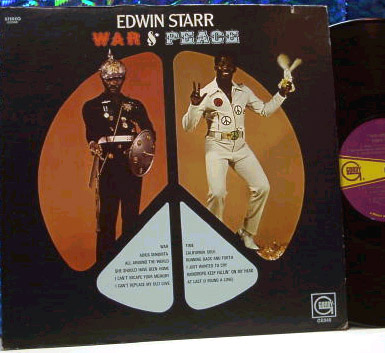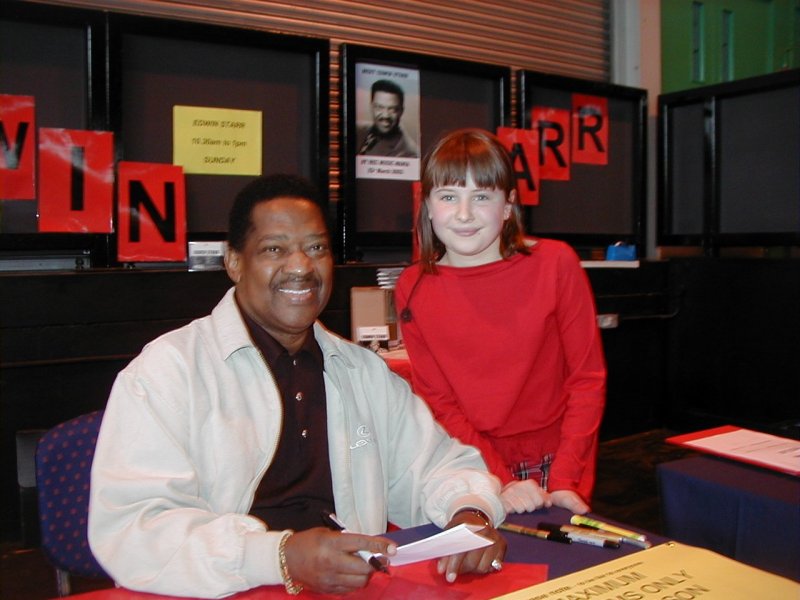Yakety Yak |
||
Don't talk back. Perspectives on the rock 'n' roll and R&B of the '50s, '60s and '70s by Freddy Mac
and Snackie Archives |
Monday, March 24, 2003
Good God, y'all: At a time like this, it's hard for a boomer like myself not to hear it in his head: a sudden blast of horns, and a strong, black man's voice. War -- hunh -- yeah! What is it good for? Absolutely nothin'. Back when it was Vietnam that was being marched about, this was quite a statement to be coming out of the soul music scene. Motown Records had decided that it needed to become more "relevant" to stay alive, that the moon-and-June lyrics of the early '60s were becoming obsolete, and that psychedelia and strong anti-war feelings were what the young people wanted to hear about. War -- hunh! Good God, y'all! What is it good for? Absolutely nothin'.  And so along with psychedelic guitars behind the Temptations, and the loosening of the tight reins that had been kept on the writing ambitions of Marvin Gaye and Stevie Wonder, Motown spun out the bold hit single "War." The thundering voice that carried the Norman Whitfield/Barrett Strong tune belonged to Edwin Starr, a performer who may have just missed greatness, but who put out some undeniably high-quality sounds over the years. The Temptations had recorded "War" first, but the man behind Motown, Berry Gordy, decided that they would make too many waves if they featured the song as one of their singles. So Edwin was tapped to re-record it, and the rest is music history. And so along with psychedelic guitars behind the Temptations, and the loosening of the tight reins that had been kept on the writing ambitions of Marvin Gaye and Stevie Wonder, Motown spun out the bold hit single "War." The thundering voice that carried the Norman Whitfield/Barrett Strong tune belonged to Edwin Starr, a performer who may have just missed greatness, but who put out some undeniably high-quality sounds over the years. The Temptations had recorded "War" first, but the man behind Motown, Berry Gordy, decided that they would make too many waves if they featured the song as one of their singles. So Edwin was tapped to re-record it, and the rest is music history.
Starr has been quoted as saying that "War" was more about interpersonal relationships than about Vietnam. One site has him explaining it this way: Nobody really understood what we were talking about on that song. It wasn't about Vietnam. It never once mentioned the war in Vietnam. It just so happened that, at the time, the war was going on, and the words just lent themselves to the occasion. Actually, we were talking about a war of people -- the war people wage against each other on a day-to-day basis. All the words are applicable to neighbors who fight with each other, you know, 'War, what is it good for?' That's what the song was about, at least for me.If he's on stage these days, I'm sure he's getting a few requests for the song. It sounds like he may be tired of it. Although he originally had a hit in 1965 with "Agent Double-0-Soul" on a label called Ric Tic before he joined the Motown stable, Starr made his first major appearance on my radio with a classic Detroit soul rocker called "Twenty-Five Miles," released on Motown affiliate Gordy. "Twenty-Five Miles" recounts a man's long but happy and ultimately worthwhile journey, on foot, back to his girl. Starr is credited as co-writer of the song with Johnny Bristol and Harvey Fuqua, but some say he wrote it himself. The opening of this single brings a smile to my face and a tap to my toe every time. There are a few simulated marching steps on top of a coy little organ and drum intro over which Edwin shouts gleefully: The Funk Brothers machine then kicks in, and things are at their finest down in the Snakepit. As the singer sings and shouts his way through a gradual countdown to the last mile, he's joined by a group of backup singers, and by the end, the studio is about a foot off the ground: "Walkin'! I got to walk on!" Righteous.  Just as that hit was gaining airplay, or perhaps while it was still obscure, I happened to catch Edwin at Madison Square Garden. He was opening for the Temps, and between the two acts was nasty old Moms Mabley, a truly unique comedienne. It was the first concert I'd ever been to (except for a Herman's Hermits show with my parents as a very young kid), and I was in my true glory with my favorite singing group about to come on and my high school girlfriend of just a few months by my side. Starr hopped up onto the in-the-round stage and took command. Although his set must have been short, I distinctly remember him opening with Sly and the Family Stone's "Sing a Simple Song." The very first song at my very first grownup concert -- what a thrill. (As for the Temps, well, that's a whole 'nother post, or two or three.) Just as that hit was gaining airplay, or perhaps while it was still obscure, I happened to catch Edwin at Madison Square Garden. He was opening for the Temps, and between the two acts was nasty old Moms Mabley, a truly unique comedienne. It was the first concert I'd ever been to (except for a Herman's Hermits show with my parents as a very young kid), and I was in my true glory with my favorite singing group about to come on and my high school girlfriend of just a few months by my side. Starr hopped up onto the in-the-round stage and took command. Although his set must have been short, I distinctly remember him opening with Sly and the Family Stone's "Sing a Simple Song." The very first song at my very first grownup concert -- what a thrill. (As for the Temps, well, that's a whole 'nother post, or two or three.)
Starr's birth name was Charles Hatcher. Born in Nashville in 1942, he grew up in Cleveland, where he sang in a doo wop group in high school. After a stint in the military, he sang with a group put together by a guy named Bill Doggett. After scoring with "Agent Double-0-Soul," his R&B Top 10 hit that rode the popularity of James Bond, he moved to Detroit to make his professional move. According to biographer Steve Huey, "Starr capitalized on the song's novelty appeal by appearing on-stage in a spy costume complete with toy gun, but proved he was no one-trick pony by returning to the Top Ten a year later with 'Stop Her on Sight (S.O.S.).'" (As for "War," Huey marvels that it was "arguably the most incendiary song Motown ever released.") Starr was definitely no slouch in the songwriting department. In addition to "Double-0-Soul," "S.O.S.," and "Twenty-Five Miles," he penned "Oh How Happy," one of the loveliest soul hits of the '60s, which was recorded by the Shades of Blue.  After "War," I lost track of Starr for a while, but fast-forward about 12 years to an early aerobics class, and he turned up again. One of the tracks that my wonderful aerobics instructor put us through our paces with was a disco number called "H.A.P.P.Y. Radio," which I was surprised to find out was written and recorded by none other than Edwin Starr. I've got a copy of his album of the same name -- a DJ demo that I picked up literally for $1 somewhere -- on the 20th Century Fox label. Apparently this was a follow-up to another disco hit of his called "Contact," but I guess I missed the boat on that one. Before he left Motown, Starr had added to his catalog with the soundtrack to the blaxploitation flick "Hell Up in Harlem," but it wasn't a hit, to be sure. After "War," I lost track of Starr for a while, but fast-forward about 12 years to an early aerobics class, and he turned up again. One of the tracks that my wonderful aerobics instructor put us through our paces with was a disco number called "H.A.P.P.Y. Radio," which I was surprised to find out was written and recorded by none other than Edwin Starr. I've got a copy of his album of the same name -- a DJ demo that I picked up literally for $1 somewhere -- on the 20th Century Fox label. Apparently this was a follow-up to another disco hit of his called "Contact," but I guess I missed the boat on that one. Before he left Motown, Starr had added to his catalog with the soundtrack to the blaxploitation flick "Hell Up in Harlem," but it wasn't a hit, to be sure.
Where is he now? A few sites report that he lives in England, tours in Europe, and plays on the oldies circuit. Apparently he toured with Martha Reeves and Frieda Payne last year. It looks as though he also put out a live album of his hits not too far back. Wherever you are, Edwin, you're still tellin' it on my stereo: Induction -- then destruction -- who wants to die? UPDATE, 4/2/03: Edwin Starr died earlier today. Obituaries can be found here, here, here and here. |
|